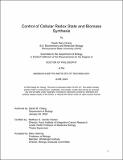Control of Cellular Redox State and Biomass Synthesis
Author(s)
Chang, Sarah Mary
DownloadThesis PDF (4.891Mb)
Advisor
Vander Heiden, Matthew G.
Terms of use
Metadata
Show full item recordAbstract
To proliferate, tumors must synthesize sufficient biomass, such as proteins, nucleotides, and lipids. Many nutrients that produce biomass undergo oxidation reactions that require the redox cofactor NAD+ as an electron acceptor. Thus, the cellular redox state, measured by the NAD+/NADH ratio, can constrain the synthesis of oxidized biomass. This dissertation aims to uncover the determinants of the cellular NAD+/NADH ratio and how the cellular redox state governs biosynthetic capabilities of cancer cells in response to elevated biomass demands. In serine depleted conditions, which increase the NAD+ demand to support serine synthesis, we find that modulating the NAD+/NADH ratio proportionally alters serine synthesis rates. We uncover that some cancer cells elevate mitochondrial respiration and increase the NAD+/NADH ratio following serine withdrawal while others do not. Increasing mitochondrial respiration is sufficient to elevate the NAD+/NADH ratio and improve serine synthesis and proliferation in serine depleted conditions. Exogenous lipid withdrawal can also elevate mitochondrial respiration and the NAD+/NADH ratio, leading to increased serine synthesis despite no change in serine demand. Together, we find that the cellular NAD+/NADH ratio is regulated by mitochondrial respiration in a cell and environment specific manner, impacting oxidative biosynthesis reactions to determine the proliferative capacity of cancer cells in different nutrient environments.
Date issued
2024-05Department
Massachusetts Institute of Technology. Department of BiologyPublisher
Massachusetts Institute of Technology